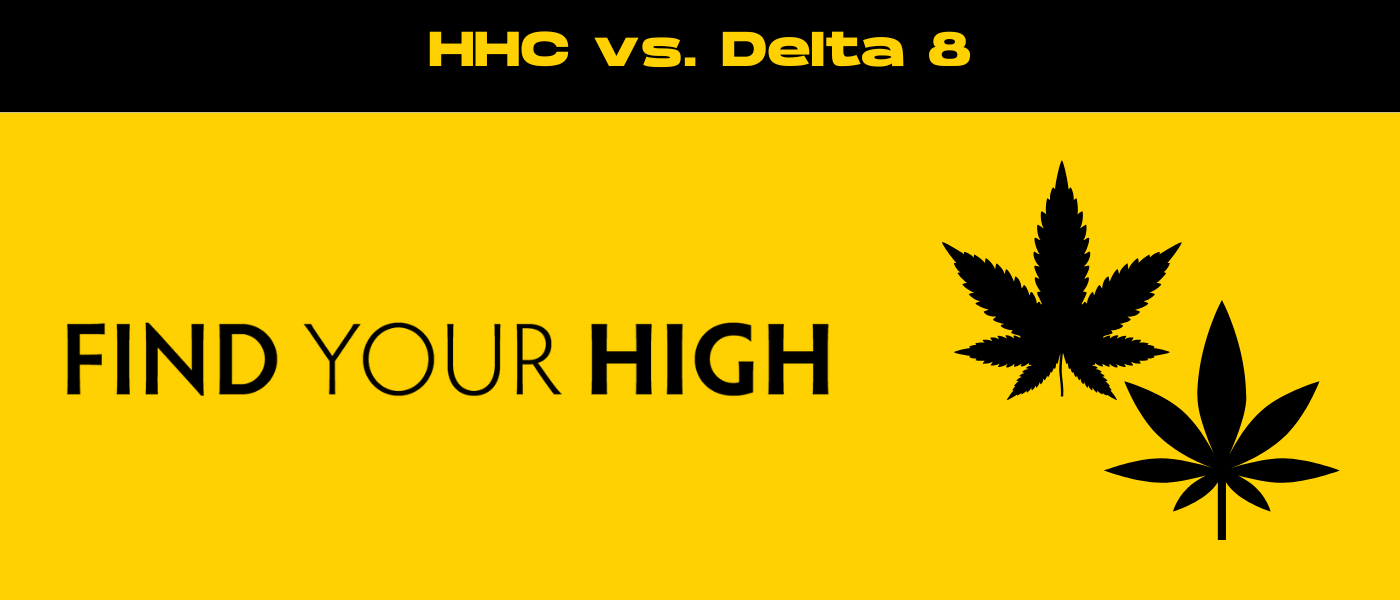In the ever-evolving world of cannabinoids, HHC (Hexahydrocannabinol) and Delta 8 THC have emerged as two popular alternatives to the traditional Delta 9 THC, the compound most commonly associated with cannabis. As more people explore these cannabinoids, understanding how they compare is essential for making informed decisions about their use.
If you’re wondering about the differences between HHC vs Delta 8, their effects, legality, and potential benefits, you’ve come to the right place. Let’s dive deep into each cannabinoid, explore their unique properties, and help you decide which might be the best fit for your needs.

What is HHC?
HHC, or Hexahydrocannabinol, is a hydrogenated form of Delta 9 THC. While it’s relatively new to the cannabis market, HHC has quickly gained attention for its mild effects and unique properties.
Chemically, HHC is similar to THC but with a slight difference in their distinct chemical structures: the addition of hydrogen atoms. This makes HHC more stable and potentially less prone to oxidation, which could extend its shelf life compared to Delta 9 THC.
HHC is typically derived from hemp and is synthesized through a process that involves hydrogenating THC, creating a new compound that retains some of the characteristics of Delta 9, but with slightly different effects.
What is Delta 8 THC?
Delta 8 THC is another cannabinoid that has been making waves in the cannabis community. Like Delta 9, Delta 8 is a form of THC, but with a subtle difference in its molecular structure.
Delta 8 THC occurs naturally in cannabis, but in much smaller amounts compared to Delta 9. As a result, it is typically extracted from CBD or hemp and refined to create products that are both effective and legal in many areas.
The main appeal of Delta 8 is that it provides a similar experience to Delta 9, but with a more manageable and less intense high. Many people find it ideal for those who want the benefits of THC without the anxiety or overwhelming euphoria that Delta 9 can sometimes cause.
The Origins of HHC and Delta 8
History of HHC
HHC was first discovered in the 1940s by American chemist Roger Adams, who was known for his pioneering work with cannabinoids. However, it wasn’t until recently that HHC became a popular product in the cannabis market.
The chemical process called hydrogenation that creates HHC is not a new one; it’s commonly used in other industries like food production, but its application to other cannabinoids is recent.
History of Delta 8
Delta 8 THC has gained significant attention in recent years, partly due to the rise in popularity of cannabis-derived products in legal markets. While it occurs naturally in cannabis, it’s usually in very small quantities, which is why it is synthesized from CBD in commercial products.
Delta 8’s legal status, combined with its ability to provide mild psychoactive effects, made it a go-to option for users looking for a gentler alternative to Delta 9.
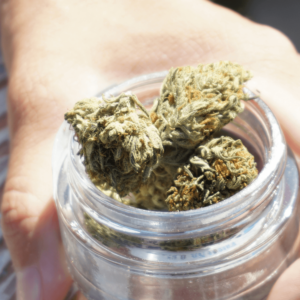
How HHC and Delta 8 Are Made
HHC Production
HHC is made through a process called hydrogenation, where hydrogen atoms are added to the THC molecule. This chemical modification changes the structure of the molecule, making it more stable and resistant to degradation.
While HHC is derived from cannabis, it’s typically synthesized in a lab and used in various products like edibles, vapes, and tinctures.
Delta 8 Production
Delta 8 is often derived from CBD (cannabidiol) that’s extracted from hemp. The extraction process separates the CBD from the hemp plant, and then Delta 8 is created through a process called isomerization, which involves converting CBD into Delta 8 THC. This makes Delta 8 both a hemp-derived and a THC compound, though it is less potent than Delta 9.
Chemical Structure: HHC vs Delta 8
The chemical structure of HHC and Delta 8 THC is one of the primary factors influencing their effects.
- HHC: When hydrogen is added to Delta 9 THC, the structure of HHC becomes more stable and less volatile. This can result in less psychoactive potency than Delta 9 or Delta 8.
- Delta 8: Delta 8 THC is very similar to Delta 9, except for the placement of a double bond in the molecular structure. This minor difference leads to a less potent psychoactive effect than Delta 9 THC, but more potent than HHC.
This small structural difference is what contributes to their different effects on the body and mind.
How HHC and Delta 8 Affect the Body
Both HHC and Delta 8 interact with the body’s endocannabinoid system (ECS), but they do so in slightly different ways.
- HHC: HHC is believed to have a mild psychoactive effect, similar to Delta 9, but it’s more subtle. Users report feeling relaxed and mildly euphoric, with a sense of well-being, but without the intense high typically associated with traditional THC.
- Delta 8: Delta 8 THC produces effects that are comparable to Delta 9 but less intense due to the way the this cannabis plant compound binds to cannabinoid receptors. Users typically feel relaxed and uplifted, with some experiencing improved focus and clarity. Delta 8 is less likely to induce anxiety or paranoia, which makes it a popular choice for first-time users of THC.
HHC vs Delta 8: Potency and Effects
Potency Comparison
- HHC: Generally, HHC is considered to be less potent than Delta 8 THC, which makes it more appealing to those seeking a light, non-intoxicating experience.
- Delta 8: Delta 8 THC is often considered about 50-75% as potent as Delta 9 THC, meaning it still delivers a significant effect but without the overwhelming intensity that some users find undesirable.
User Experience
- HHC: HHC users often describe the effects as being mild and relaxing, without a heavy “high.” It may be a good option for those who enjoy the calming effects of THC but don’t want the strong intoxication.
- Delta 8: Delta 8 provides a more noticeable euphoria, a little more heady than HHC. It’s often used for relaxation and stress relief, and many people use it for focus during daytime activities.
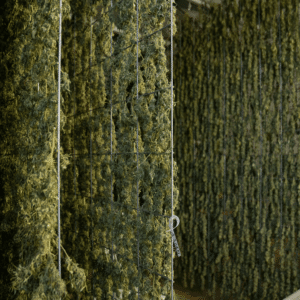
Safety and Side Effects: HHC vs Delta 8
Common Side Effects of HHC
- Dry mouth
- Mild dizziness
- Fatigue or sleepiness
- Possible lightheadedness
Common Side Effects of Delta 8
- Dry mouth
- Altered perception of time
- Mild anxiety (in some users)
- Increased appetite
While both HHC and Delta 8 are generally regarded as safe when used responsibly, it’s always important to monitor your body’s reaction to any new substance.
HHC vs Delta 8: Legal Status
The legal status of hemp-derived cannabinoids can be confusing, especially when it comes to new compounds like HHC and Delta 8.
- HHC: The legality of HHC remains unclear in many jurisdictions. Because it is a derivative of THC, its legal status often mirrors that of other THC compounds. In many places, it’s considered a legal gray area. However, it is often marketed as a legal alternative to Delta 9 THC.
- Delta 8: Delta 8 THC is legal in many states due to its origins in hemp. However, certain states have moved to restrict or ban Delta 8, making it essential to check local regulations before purchasing.
Both cannabinoids are affected by the Agriculture Improvement Act or 2018 Farm Bill, which legalized hemp-derived products that contain less than 0.3% Delta 9 THC. However, the legal status of synthetically produced cannabinoids like HHC and Delta 8 can differ based on local laws.
Which is Stronger: HHC or Delta 8?
When it comes to potency, Delta 8 THC is generally stronger than HHC. Although both are less potent than Delta 9, Delta 8 still produces noticeable effects in terms of relaxation, euphoria, and mild intoxication.
On the other hand, HHC is much milder, making it a great choice for those who want a non-intoxicating experience with just a hint of relaxation.
Benefits of HHC
HHC is gaining attention for its potential therapeutic benefits. Some users report:
- Pain relief: HHC may offer mild anti-inflammatory properties, helping those with chronic pain or discomfort.
- Stress relief: With its calming effects, HHC could be used to alleviate anxiety and promote overall relaxation.
- Sleep aid: Many people find that HHC helps them unwind before bed without being overly sedative.
Benefits of Delta 8
Delta 8 THC is known for its unique balance of mild psychoactive effects and potential medicinal benefits. Some benefits include:
- Anxiety reduction: Delta 8 has been reported to reduce anxiety and induce a calming state without the paranoia sometimes associated with Delta 9.
- Nausea relief: Delta 8 is often used by individuals undergoing treatments like chemotherapy to reduce nausea and vomiting.
- Mood enhancement: It can elevate mood, increase focus, and improve overall well-being.
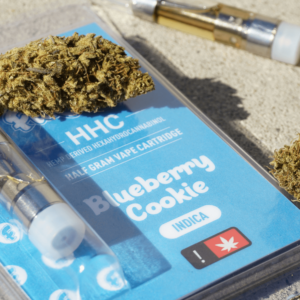
HHC vs Delta 8: Cost and Availability
- HHC: Due to its newer emergence on the market, HHC products tend to be slightly more expensive than Delta 8. The cost of HHC varies based on the type of product and the manufacturer.
- Delta 8: Delta 8 THC has been widely available for several years and is generally more affordable. It’s easier to find Delta 8 products in dispensaries and online stores like Hyperwolf LA.
Consumer Preferences: HHC vs Delta 8
Consumer preferences vary based on the effects they seek.
- HHC: People who want a mild, relaxed experience without feeling overly intoxicated tend to choose HHC.
- Delta 8: Those looking for a gentle high with the ability to function normally during the day often prefer Delta 8.
The Future of HHC and Delta 8 in the Cannabis Industry
As the cannabis industry continues to grow, both HHC and Delta 8 are expected to play larger roles. With increasing interest in less-intense THC alternatives, these cannabinoids may become more mainstream.
- Research into the benefits and safety profiles of both cannabinoids is ongoing, which could lead to a better understanding of their therapeutic uses.
- Regulatory changes: As both cannabinoids gain popularity, expect potential changes to their legal status at both the state and federal levels.
Conclusion: HHC or Delta 8? Which One Should You Choose?
Ultimately, whether you choose HHC or Delta 8 depends on your personal preferences and goals. If you’re seeking a milder, more stable cannabinoid with subtle effects, HHC may be the right option. On the other hand, if you’re looking for a more pronounced experience without the intensity of Delta 9 THC, Delta 8 could be a better fit.
Always consider your local laws, the desired effects, and your own tolerance when choosing between HHC and Delta 8. As with any cannabinoid, start with a small dose and see how it affects you before increasing.
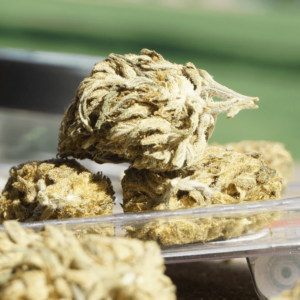
Frequently Asked Questions
1. Does HHC or delta-8 get you higher?
While both HHC and Delta 8 are less potent than Delta 9 THC, they still produce psychoactive effects. Delta 8 tends to create a more noticeable high compared to HHC. It offers a mild euphoria and relaxation, similar to Delta 9 but less intense. On the other hand, HHC is typically milder, offering subtle effects with a sense of calm and relaxation without the strong intoxication that some people associate with THC.
So, Delta 8 will generally get you higher than HHC, though both are considered more manageable alternatives to Delta 9.
2. Is HHC the most potent?
No, HHC is not the most potent cannabinoid. It is generally considered to be less potent than Delta 8 and much less potent than Delta 9 THC. While HHC does produce effects similar to THC, it is often described as a milder, more subtle experience. If you’re looking for something with a more noticeable high, Delta 8 would be a stronger option.
3. Is HHC more sativa or indica?
HHC does not have a direct classification as sativa or indica because its effects are generally more subtle and vary from person to person. The effects of HHC are typically described as calming, relaxing, and mildly euphoric, which can lean towards the relaxing nature often associated with indica strains. However, some users might feel more focused and uplifted, which can resemble the effects of sativa strains. Ultimately, it depends on the individual’s response to the compound.
4. What gets you higher, HHC or Delta 9?
Delta 9 THC is much more potent than HHC. It produces a strong psychoactive effect, often leading to a significant “high,” with intense euphoria, altered perception, and possible impairments in motor skills. HHC, on the other hand, is much less potent, providing a mild, more controlled experience. If you’re looking for a stronger high with significant psychoactive effects, Delta 9 is the more potent choice. However, HHC offers a more subdued experience with less intense effects.
5. How does THCa Flower compare to HHC and Delta 8?
THCa Flower differs from HHC and Delta 8 in that it primarily contains tetrahydrocannabinolic acid (THCa), which is non-psychoactive until heated. When consumed raw, THCa Flower provides potential therapeutic benefits without the intoxicating effects. Once heated, it converts to THC, delivering stronger psychoactive effects compared to HHC and Delta 8. If you’re looking for a product that offers versatility—both non-intoxicating and psychoactive options—THCa Flower could be an excellent choice.




